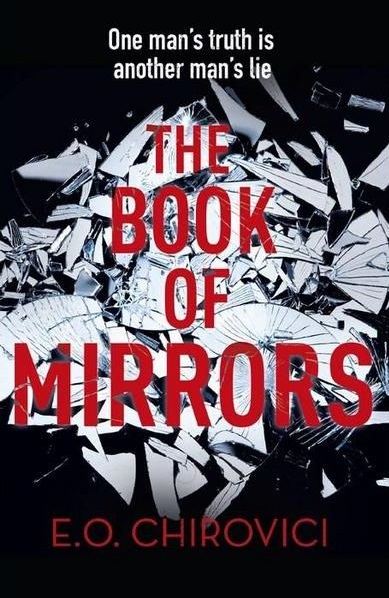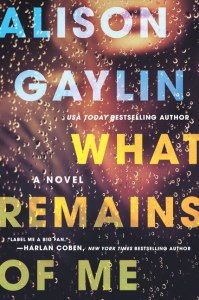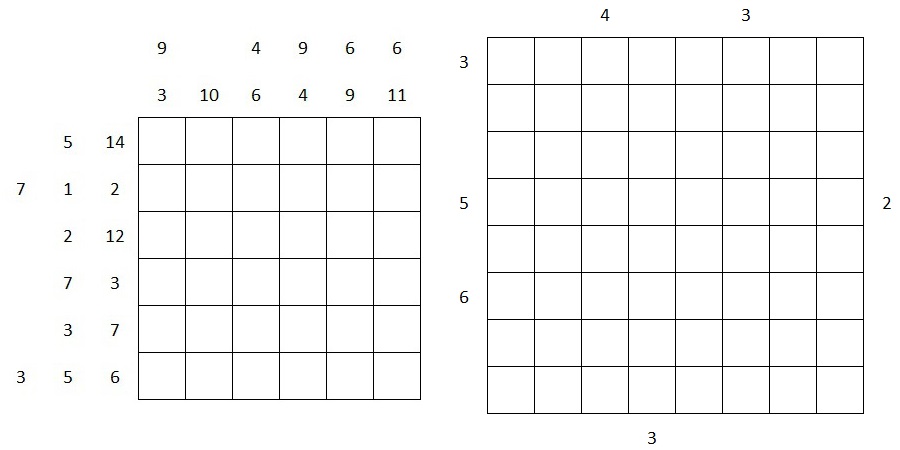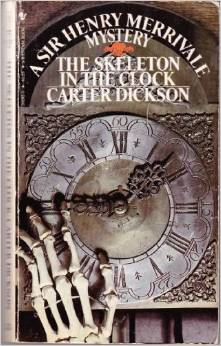 Capsule Review: Another murder in retrospect with multiple POV characters, this time the murder of a Princeton professor back in the 80s. There’s a nice hook, in that the first account of the murder is sent to a literary agent in the form of a submission sample, but by the time he reads it the author has died of cancer and the manuscript is missing. But then the book bogs down in a series of indistinguishable lumpen conversations, and the solution is too heavily telegraphed to be interesting. Not recommended.
Capsule Review: Another murder in retrospect with multiple POV characters, this time the murder of a Princeton professor back in the 80s. There’s a nice hook, in that the first account of the murder is sent to a literary agent in the form of a submission sample, but by the time he reads it the author has died of cancer and the manuscript is missing. But then the book bogs down in a series of indistinguishable lumpen conversations, and the solution is too heavily telegraphed to be interesting. Not recommended.
What Remains of Me (Alison Gaylin, 2016)

Capsule Review: What seems like a standard “Hollywood murder in the past” setup actually has an unusual and interesting kaleidoscopic solution, but the over-the-top ‘80s LA flashbacks and the unwieldy number of POV characters in the modern sections make What Remains of Me hard to recommend. Continue reading
From the ashes…
Wow. Over a year since my last post. In my defence, it’s been pretty hectic. I’ve been to a dozen countries, taken about forty flights and finally finished editing work on a two-year book project. I’ve barely had time to read any mysteries, let alone write about them.
Then a few weeks ago I received a slightly depressing popup from WordPress. I’ve apparently had this domain registered for over 7 years! That’s a really long time. Despite some occasional flurries of activity, I’ve never really managed to keep to an organised blogging schedule. Attempts to fix this have either been too regimented and ambitious (so I inevitably fall behind and give up) or too casual (so I spend weeks drafting a post and then it’s never quite right or stops being relevant and I give up).
But despite the incredibly sparse offerings, I still get a steady stream of visitors. I still get regular comments (even discounting the weekly requests for me to identify the teapot in Father Brown!). I talk to several very engaging readers over email, who are very patient about my infuriatingly sporadic replies. I even get developmental editing work (my day job) from people who’ve found their way to me via the blog rather than the usual channels.
And I think there’s definitely still a yawning opening for what I planned to create when I set this up all those years ago: a site with criticism, analysis and discussion about mystery writing, rather than just reviews.
Crime and mystery fiction are as popular as ever, and self-publishing has shrugged off its embarrassing connotations and become a force to be reckoned with, with dozens of mysteries by indie authors being added to Amazon each day. But there’s still almost zero resources for people who want to learn and discuss how to write them better.
And that’s because everyone’s terrified of spoilers. Even plot points in books which are over 100 years old are still tiptoed round with hushed reverence.
Which is not to say that people should be subjected to spoilers without warning. But there needs to be a place for people who are happy to forego a few surprises (almost always relating to stories they’ve already read or were never going to read anyway) in exchange for getting to discuss all the fascinating tricks and techniques that makes mysteries so interesting, popular and unique.
Because this is important theory. One crucial thing that I’ve learned from my work as a developmental editor is that mystery writing techniques aren’t unique to mystery fiction. Many of them are a fundamental part of ALL storytelling, but they are often overlooked because they work in the background. All stories, regardless of genre, length and medium have to handle things like plot structure, plot pacing, revelation of new information and managing and directing readers’ knowledge and expectations. Mysteries are a perfect place to learn about these things.
Studying mystery fiction, especially the more mechanical fair play puzzle plots of the Golden and Silver Ages, is a great way to learn about these aspects of storytelling in a laboratory setting, as it were. Some people lambaste classic mystery fiction for having weak characters, thinly drawn settings and indeed for lacking much of anything that isn’t related to the central business of finding out whodunit and unmasking them in the drawing room. And while that’s true in some cases, if you want to learn about how mysteries work so you can use the tricks in a more rounded novel, it’s actually very helpful to have a pared down story where are the cogs are exposed as study material. And of course in most cases it isn’t true at all. Most people’s idea of classic mysteries as creaky automata draped with 30s snobbery is based on parodies of the genre, not the genre itself. Many of the era’s best authors were able to weave together plot, character and social commentary very artfully, often in 50,000 words or less. Most modern crime fiction is far less incisive and twice as bloated.
Anyway, now that my workload is a bit less hectic, it’s time to give it another go. I think a light but regular schedule is best. And people do like reviews, especially of current or unusual works. So starting next week, here’s how things are going to go:
On Mondays there’ll be a review. I’ll try to keep these spoiler-free, with spoilers either reserved until the end or omitted entirely.
On Thursdays there’ll be a more technical article about writing technique, usually related to the Monday review. This will be full spoiler territory, with the exception of the paragraph that appears on the front page – there will never be spoilers there.
Every other Saturday there’ll be something a bit longer. This might be a continuation of the Thursday post, discussion about a topic that needs to run a bit longer or some of my own mystery short stories.
I hope you’ll join me!
Death at the Opera (Gladys Mitchell, 1934)
 Shy mathematics teacher Calma Ferris has generously offered to fund her school’s play, a staff performance of The Mikado. As a reward, she’s chosen to play the part of the fearsome Katisha, despite being completely unsuited to the role. But she never makes it on stage. She misses her Act 1 cue, and a replacement is hastily found.
Shy mathematics teacher Calma Ferris has generously offered to fund her school’s play, a staff performance of The Mikado. As a reward, she’s chosen to play the part of the fearsome Katisha, despite being completely unsuited to the role. But she never makes it on stage. She misses her Act 1 cue, and a replacement is hastily found.
After the performance, Miss Ferris is found drowned in one of the school’s wash basins. The coroner returns a suicide verdict, but who would kill themselves by stopping up a drainpipe with modeller’s clay? But, conversely, who could possibly want to kill such an unassuming woman? The headmaster, unsatisfied with the verdict but fearing a scandal, calls in Mrs Bradley to investigate. But there’ll be two more drownings before she unmasks the culprit…
In brief: Well-observed and enjoyably waspish, with good pacing and strong clues. A relatively “normal” Mitchell mystery, and stronger for it. But be prepared for some outlandish character motivation in the final pages.
More detail, but no spoilers, below the cut.
Solve-Along Interlude: Puzzle Doctor’s Puzzles
 I’m feeling a bit listless today, so how about a puzzle break? My gut feeling is that the Venn diagram of mystery lovers and puzzle lovers has a huge overlap. The Puzzle Doctor has finally capitulated to nagging on multiple fronts and begun to post about his experience at the World Puzzle Championships. I once applied to enter, many moons ago, but never got further than the application stage (and I may even have been very naughty and lied about my age, so it’s probably best I didn’t get through…) Continue reading
I’m feeling a bit listless today, so how about a puzzle break? My gut feeling is that the Venn diagram of mystery lovers and puzzle lovers has a huge overlap. The Puzzle Doctor has finally capitulated to nagging on multiple fronts and begun to post about his experience at the World Puzzle Championships. I once applied to enter, many moons ago, but never got further than the application stage (and I may even have been very naughty and lied about my age, so it’s probably best I didn’t get through…) Continue reading
Solve-Along: The Skeleton in the Clock (Part 2)
Time for the second part of my Solve-Along for The Skeleton in the Clock. Part one can be found here.
clueQuest: Plan52 (London, August 2014)
 I feel like I’ve spent all bank holiday carping about people more creative than me. Time for something a bit more positive: clueQuest. I played this in London a few weeks ago and it was a lot of fun. Definitely recommended. Not so recommended that I don’t have some criticisms (of course!), but it was an unusual hour well-spent and worth the money. Part of the enjoyment was due to the ingenuity of the puzzles, so I’m going to arrange this review in order of increasing spoilerness. At the request of the game staff I’m not going to spoil many specifics, but if you’re in the London area and this seems like something you’d like to do, stop reading about halfway through. Continue reading
I feel like I’ve spent all bank holiday carping about people more creative than me. Time for something a bit more positive: clueQuest. I played this in London a few weeks ago and it was a lot of fun. Definitely recommended. Not so recommended that I don’t have some criticisms (of course!), but it was an unusual hour well-spent and worth the money. Part of the enjoyment was due to the ingenuity of the puzzles, so I’m going to arrange this review in order of increasing spoilerness. At the request of the game staff I’m not going to spoil many specifics, but if you’re in the London area and this seems like something you’d like to do, stop reading about halfway through. Continue reading
Solve-Along: The Skeleton in the Clock (Part 1)
If you haven’t read one of these before, I write up my thoughts on a mystery as I go along, and try and solve it before the end. To avoid devastating people with spoilers, I try to pick books that are very obscure or have had poor reviews. This time, it’s Carter Dickson’s The Skeleton in the Clock. Continue reading
Death in Paradise (Series 3, Episode 3, first ten minutes)
The internet has cut out, just over a fifth (12m 15s) of the way into this week’s episode of Death in Paradise. While I’m waiting for it to come back online, I’m going to make a prediction about whodunit. Not to show off, but because I think there are certain sorts of clues that really stand out, especially in dialogue, and clients are often interested in techniques for making this kind of information less (and occasionally more) prominent. Details are going to be a bit fuzzy, because I can’t go back to check them. But obviously there are going to be spoilers for the episode. Continue reading
Sister (Rosamund Lupton, 2010)
 A bit of a departure for me, this, but I’ve been ill and it was the first book that fell to the ground when I flailed at the bookcase. I don’t know where I got it from. I think it was recommended as part of the Richard and Judy book club, which is a sort of low-rent version of Oprah’s book club here in the UK. It’s surprisingly good, at least for the first two-thirds. Sensitively drawn but densely layered. Unfortunately it descends into implausibility in the final stretch, and the closing twist, while ambitious, doesn’t make much sense in light of what’s gone before. But worth a read.
A bit of a departure for me, this, but I’ve been ill and it was the first book that fell to the ground when I flailed at the bookcase. I don’t know where I got it from. I think it was recommended as part of the Richard and Judy book club, which is a sort of low-rent version of Oprah’s book club here in the UK. It’s surprisingly good, at least for the first two-thirds. Sensitively drawn but densely layered. Unfortunately it descends into implausibility in the final stretch, and the closing twist, while ambitious, doesn’t make much sense in light of what’s gone before. But worth a read.
Anyway, that’s your lot if you’re trying to avoid spoilers. After the cut I’ll be talking about the whole thing, including that final twist. Continue reading
